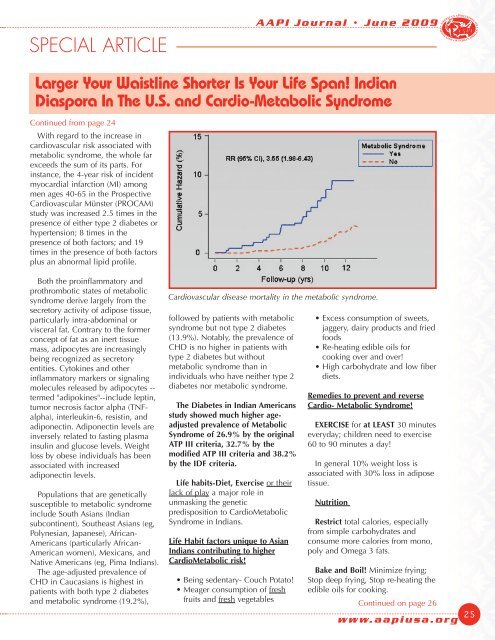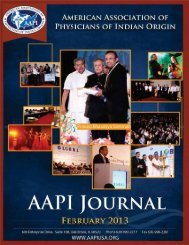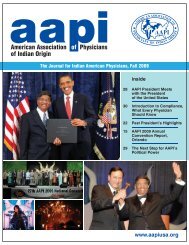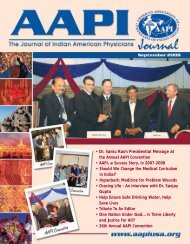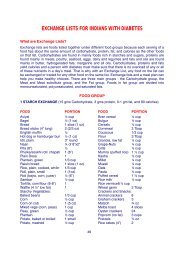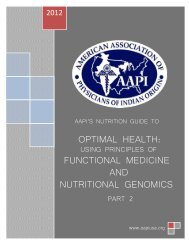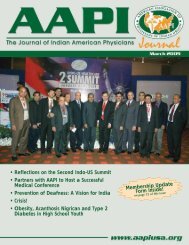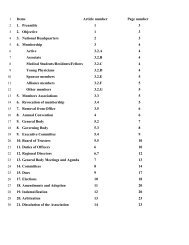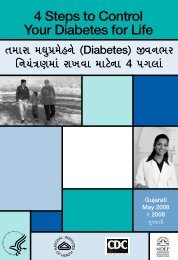Physician Scientist - American Association of Physicians of Indian ...
Physician Scientist - American Association of Physicians of Indian ...
Physician Scientist - American Association of Physicians of Indian ...
You also want an ePaper? Increase the reach of your titles
YUMPU automatically turns print PDFs into web optimized ePapers that Google loves.
SPECIAL ARTICLE<br />
AAPI Journal • June 2009<br />
Larger Your Waistline Shorter Is Your Life Span! <strong>Indian</strong><br />
Diaspora In The U.S. and Cardio-Metabolic Syndrome<br />
Continued from page 24<br />
With regard to the increase in<br />
cardiovascular risk associated with<br />
metabolic syndrome, the whole far<br />
exceeds the sum <strong>of</strong> its parts. For<br />
instance, the 4-year risk <strong>of</strong> incident<br />
myocardial infarction (MI) among<br />
men ages 40-65 in the Prospective<br />
Cardiovascular Münster (PROCAM)<br />
study was increased 2.5 times in the<br />
presence <strong>of</strong> either type 2 diabetes or<br />
hypertension; 8 times in the<br />
presence <strong>of</strong> both factors; and 19<br />
times in the presence <strong>of</strong> both factors<br />
plus an abnormal lipid pr<strong>of</strong>ile.<br />
Both the proinflammatory and<br />
prothrombotic states <strong>of</strong> metabolic<br />
syndrome derive largely from the<br />
secretory activity <strong>of</strong> adipose tissue,<br />
particularly intra-abdominal or<br />
visceral fat. Contrary to the former<br />
concept <strong>of</strong> fat as an inert tissue<br />
mass, adipocytes are increasingly<br />
being recognized as secretory<br />
entities. Cytokines and other<br />
inflammatory markers or signaling<br />
molecules released by adipocytes --<br />
termed "adipokines"--include leptin,<br />
tumor necrosis factor alpha (TNFalpha),<br />
interleukin-6, resistin, and<br />
adiponectin. Adiponectin levels are<br />
inversely related to fasting plasma<br />
insulin and glucose levels. Weight<br />
loss by obese individuals has been<br />
associated with increased<br />
adiponectin levels.<br />
Populations that are genetically<br />
susceptible to metabolic syndrome<br />
include South Asians (<strong>Indian</strong><br />
subcontinent), Southeast Asians (eg,<br />
Polynesian, Japanese), African-<br />
<strong>American</strong>s (particularly African-<br />
<strong>American</strong> women), Mexicans, and<br />
Native <strong>American</strong>s (eg, Pima <strong>Indian</strong>s).<br />
The age-adjusted prevalence <strong>of</strong><br />
CHD in Caucasians is highest in<br />
patients with both type 2 diabetes<br />
and metabolic syndrome (19.2%),<br />
Cardiovascular disease mortality in the metabolic syndrome.<br />
followed by patients with metabolic<br />
syndrome but not type 2 diabetes<br />
(13.9%). Notably, the prevalence <strong>of</strong><br />
CHD is no higher in patients with<br />
type 2 diabetes but without<br />
metabolic syndrome than in<br />
individuals who have neither type 2<br />
diabetes nor metabolic syndrome.<br />
The Diabetes in <strong>Indian</strong> <strong>American</strong>s<br />
study showed much higher ageadjusted<br />
prevalence <strong>of</strong> Metabolic<br />
Syndrome <strong>of</strong> 26.9% by the original<br />
ATP III criteria, 32.7% by the<br />
modified ATP III criteria and 38.2%<br />
by the IDF criteria.<br />
Life habits-Diet, Exercise or their<br />
lack <strong>of</strong> play a major role in<br />
unmasking the genetic<br />
predisposition to CardioMetabolic<br />
Syndrome in <strong>Indian</strong>s.<br />
Life Habit factors unique to Asian<br />
<strong>Indian</strong>s contributing to higher<br />
CardioMetabolic risk!<br />
• Being sedentary- Couch Potato!<br />
• Meager consumption <strong>of</strong> fresh<br />
fruits and fresh vegetables<br />
• Excess consumption <strong>of</strong> sweets,<br />
jaggery, dairy products and fried<br />
foods<br />
• Re-heating edible oils for<br />
cooking over and over!<br />
• High carbohydrate and low fiber<br />
diets.<br />
Remedies to prevent and reverse<br />
Cardio- Metabolic Syndrome!<br />
EXERCISE for at LEAST 30 minutes<br />
everyday; children need to exercise<br />
60 to 90 minutes a day!<br />
In general 10% weight loss is<br />
associated with 30% loss in adipose<br />
tissue.<br />
Nutrition<br />
Restrict total calories, especially<br />
from simple carbohydrates and<br />
consume more calories from mono,<br />
poly and Omega 3 fats.<br />
Bake and Boil! Minimize frying;<br />
Stop deep frying, Stop re-heating the<br />
edible oils for cooking.<br />
Continued on page 26<br />
www.aapiusa.org<br />
25


